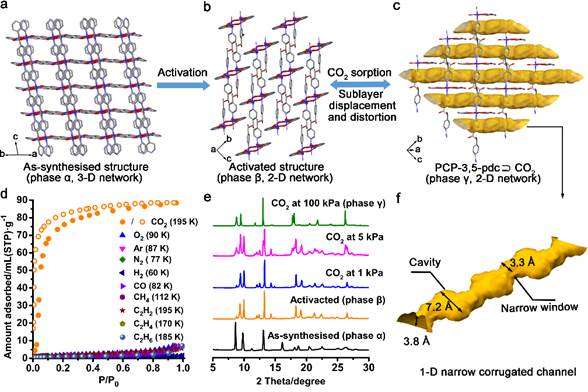Prof. Li Fengting's team from the College of Environmental Science and Engineering has had collaborative research with Prof. Susumu Kitagawa's team from Kyoto University, with the support of the Key Special Project for Intergovernmental International Cooperation of the National Key Research and Development Program (NKRDP), China. They have made progress in green CO2 ultra-precise molecular recognition and green high-efficiency gas separation materials recently. Through the precise design of the pore environment of flexible porous materials and the optimization and integration of various molecular recognition mechanisms, the materials have achieved ultra-precise molecular recognition and efficient separation of CO2. Their research result on "Soft corrugated channel with synergistic exclusive discrimination gating for CO2 recognition in gas mixture" was published in Nature Communications (DOI: 1038-s41467-023-39470-w).

PCP materials with ultra-precise CO2 molecular recognition properties
CO2 is both an important greenhouse gas and a common industrial gas impurity. The development and application of CO2 molecular identification, separation, and capture are crucial to the sustainable development of the national economy and society, and are in line with China's major strategic needs of "peak carbon dioxide emissions and carbon neutrality". The team achieved ultra-precise CO2 molecular recognition by precisely designing and modulating the flexibility, pore morphology, and action sites of the porous coordination polymer materials. The materials can only adsorb CO2 selectively through the flexible pore opening effect when faced with ten common gases, namely CO2, N2, CH4, CO, O2, H2, Ar, C2H2, C2H4, and C2H6. They also show excellent CO2 separation and capture performance in multiple gas mixtures. The results of single-crystal XRD diffraction, in situ synchrotron radiation PXRD diffraction combined with theoretical calculations show that the design of narrow corrugated channels, action sites, and suitable flexible interactions in flexible porous coordination polymers is the key to achieving ultra-precise CO2 molecular recognition. Dr. Yifan GU of Tongji University was the first author of the paper, and Prof. Ying WANG was the co-author while Prof. Fengting LI of Tongji University, Prof. Ken-ichi Otake, and Prof. Susumu Kitagawa of Kyoto University the corresponding authors.
Meanwhile, team members, including Dr. Yifan GU and associate professor Yinan WU, published other papers related to CO2 adsorption and catalytic conversion, green and efficient gas separation and water capture technology in Green Chemistry, Coordination Chemistry Reviews, and Small, and obtained several authorized patents.
The research has been funded by the Key Special Project of Intergovernmental International Cooperation of the National Key R&D Program, the National Natural Science Foundation of China, the Shanghai Pujiang Talent Project, the Science and Technology Leading Talent Program, the Intergovernmental International Science and Technology Cooperation Project of the Shanghai Municipal Science and Technology Commission, and the Basic Scientific Research Operations of the First-class Universities.